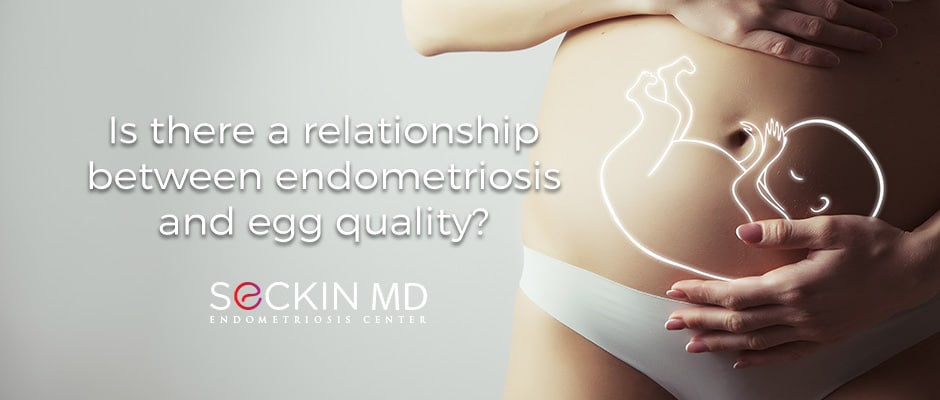Introduction
Endometriosis is a disease where tissue resembling the lining of the uterus grows elsewhere in the body. The condition affects around 176 million women worldwide [1] and about half of these women experience infertility, which is defined as the inability to conceive a child. Infertility due to endometriosis can be the result of endometrial lesions blocking the fallopian tubes or damaging the ovaries. Some researchers think that endometriosis may also cause infertility by affecting egg quality.

What is the correlation between endometriosis and egg quality?
According to a study that reviewed research articles addressing the effect of endometriosis on egg quality, eggs retrieved from women with endometriosis for in vitro fertilization (IVF) are more likely to fail compared to eggs retrieved from women with infertility due to other causes [2].
Similarly, research has shown that women with endometriosis who underwent IVF treatment using donor eggs from women without endometriosis had high success rates while in women without endometriosis undergoing IVF treatment using eggs from a donor with endometriosis, success rates were significantly reduced. This suggests that the quality of eggs might be affected by endometriosis and contribute to low fertility.
Can you conceive with a low ovarian reserve?
Ovarian reserve refers to the quality and quantity of eggs a woman has. The main factor that causes low ovarian reserve is age, although other factors such as genetics, certain treatments, and injury can also play a role. Low ovarian reserve reduces a woman’s chance of getting pregnant but she may still be able to conceive. In certain cases, assisted reproductive techniques such as IVF can help [3].
Get a Second Opinion
Our endometriosis specialists are dedicated to providing patients with expert care. Whether you have been diagnosed or are looking to find a doctor, they are ready to help.Our office is located on 872 Fifth Avenue New York, NY 10065.
You may call us at (212) 988-1444 or have your case reviewed by clicking here.
Causes
Endometriosis may affect egg quality through three main mechanisms: by creating an inflammatory environment in the reproductive tract, by affecting hormonal balance, and by reducing the blood flow to or within the ovaries.
Inflammation
Endometriosis is considered to be an inflammatory disease where the body activates an immune response against the endometrial lesions that form in different parts of the body. There are several biological factors that are produced in excess during an inflammatory response and it is thought that these factors can reduce egg quality.
Hormonal imbalance
Women with endometriosis often have endometriomas or cysts that form in or around the ovaries. It is thought that these endometriomas may disrupt the ability of the ovaries to produce the right amounts of reproductive hormones such as estrogen and progesterone, therefore, creating an environment of hormonal imbalance. This, in turn, can have a negative impact on egg development and quality.
Reduced blood flow
Endometriosis causes the formation of scar tissue in different parts of the reproductive tract. This scar tissue can compromise normal blood flow to or within the ovaries and reduce oxygen supply. This can hinder the maturation of eggs and reduce their quality.
Diagnosis
There is no direct way of measuring egg quality but a woman’s fertility can be assessed by measuring the levels of the anti-mullerian hormone (AMH) and the follicle-stimulating hormone (FSH) in the blood. AMH is secreted by cells and developing egg sacs and is a good indication of a woman’s egg reserve. FSH is secreted by the brain and stimulates egg development in the ovaries. If levels of either hormone are low, this can indicate a lower chance of embryo implantation, which is sometimes referred to as egg quality. However, AMH levels are not the only indicator of egg quality and is a more reliable marker of egg quantity.
What is a good AMH level for IVF?
AMH levels decrease naturally with age. Normal AMH levels are between 7.14 pmol/L and 28.56 pmol/L infertile women, and AMH levels below 7.14 pmol/L indicate reduced ovarian reserve [4]. According to the National Institute for Health and Care Excellence (NICE), less than 5.4 pmol/L of AMH will normally lead to a low response in IVF while AMH levels of 25 pmol/L or higher will lead to a high response [5].
Treatment
How can I increase my egg quality and quantity naturally?
Currently, there is no scientifically proven way of delaying ovarian aging or improving egg quality. However, a diet rich in omega-3 fatty acids may delay ovarian aging and improve egg quality.
A study conducted using a mouse model has shown that lifelong consumption of a diet rich in omega-3 fatty acids leads to the animals being fertile through to a later age. Conversely, a diet rich in omega-6 fatty acids is associated with very poor reproductive success when the animals are older [6]. mega-3 fatty acids are found in foods such as fish, other seafood, and soybeans, while omega-6 fatty acids are found in vegetable oils, nuts, and seeds. The study also showed that treating the mice with a diet rich in omega-3 fatty acids when their reproductive function was starting to decline due to age could improve egg quality and treating them with a diet rich in omega-6 fatty acids resulted in very poor egg quality.
Coenzyme Q10, which is an antioxidant and energy-promoting agent, is also believed to improve egg quality [7]. Coenzyme Q10 is found in foods such as meat, fish, spinach, cauliflower, broccoli, oranges, strawberries, soybeans, lentils, peanuts, sesame seeds, pistachios, soybean, and canola oil. It is also available as a supplement.
Does IVF improve egg quality?
Although IVF treatment can help a woman conceive, the procedure itself does not have an effect on egg quality. In fact, the success rate of IVF is closely linked to the quality of a woman’s eggs. In cases where egg quality is too low, women can become pregnant using donor eggs that are fertilized with the sperm of the woman’s partner using IVF and then implanted back into her uterus.
Our Approach
We perform excision surgery that removes endometriosis. If the ovaries are involved with endometriotic cysts, also known as endometriomas, meticulous removal of the cyst is performed, followed by reconstruction of the ovary. This can help preserve and increase the number of healthy ovarian follicles and the chances of women conceiving naturally. We do not burn/ablate the ovarian endometrioma as that can destroy the surrounding ovarian tissue and lead to diminished ovarian reserve [8].
Patient Story
“It is incredible to think that the part of my body that caused me so much pain and heartache most of my life and the part that caused the most fear of not being able to carry a child, ended up being the strongest part of me when it mattered the most.”
—Jamie A.
References
- EndoFound.org: What Is Endometriosis? Causes, Symptoms, and Treatments
- NCBI: Is the oocyte quality affected by endometriosis? A review of the literature
- Fertility Center: Diminished Ovarian Reserve
- Extend Fertility: Fertility Statistics by Age
- The Association for Clinical Biochemistry & Laboratory Medicine: Assessment and treatment for people with fertility problems
- NCBI: Prolonging the female reproductive lifespan and improving egg quality with dietary omega-3 fatty acids
- NCBI: The impact of lifestyle modifications, diet, and vitamin supplementation on natural fertility
- EndoFound.org Can Endometriosis Cause Diminished Ovarian Reserve?
Get a Second Opinion
Our endometriosis specialists are dedicated to providing patients with expert care. Whether you have been diagnosed or are looking to find a doctor, they are ready to help.Our office is located on 872 Fifth Avenue New York, NY 10065.
You may call us at (646) 960-3080 or have your case reviewed by clicking here.
Dr. Seckin is an endometriosis specialist and women’s reproductive health advocate. He has been in private practice for over 30 years at Lenox Hill Hospital with a team of highly skilled personnel.
Dr. Seckin specializes in advanced laparoscopic procedures and is recognized for his expertise in complex cases of deep infiltrating endometriosis of the pelvis. He is particularly dedicated to performing fertility-preserving surgeries on cases involving the ovaries.
He has developed patented surgical techniques, most notably the “Aqua Blue Excision” technique for a better visualization of endometriosis lesions. His surgical techniques are based on precision and microsurgery, emphasizing organ and fertility preservation, and adhesion and pain prevention.
Dr. Seckin is considered a pioneer and advocate in the field of endometriosis.
